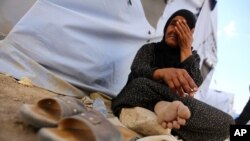GENEVA —
United Nations aid agencies are expressing alarm at the growing number of Iraqis fleeing from the onslaught of Islamic militants into their territory. As the agencies scale up their emergency operations, a crisis meeting on Iraq took place in Geneva to consider new strategies for dealing with this humanitarian disaster.
Member states attending the crisis meeting on Iraq are giving little away. But the spokesman for the Office for the Coordination of Humanitarian Affairs, Jens Laerke, confirms the talks center on the need to revise the current assistance plan for Iraq.
“There is a regional response plan already for Iraq dealing primarily with the Anbar refugees. It asks for $105 million U.S. It is 14 percent funded," said Laerke. "Now, this plan is being revised so as to take this new, dramatically increased caseload of IDPs [internally displaced persons] into account.”
The United Nations estimates half-a-million people have fled the northern Iraqi city of Mosul. It says some 25,000 remain displaced inside Mosul and tens of thousands of people have fled from other areas the Islamist militants have penetrated.
Approximately half-a-million people already were displaced from the conflict in Anbar.
The spokesman for the U.N. refugee agency, Adrian Edwards, tells VOA that in the current chaotic situation, security is a major concern as aid agencies expand emergency operations.
“Conflict and war, as you know, produces displacement," he said. "Conflict and war also makes it more difficult to help people. In addition to that, when you have a refugee camp, the security actors who normally help deal with security around that camp are no longer present. So, this is a very, very real worry indeed.”
Besides providing relief for hundreds of thousands of displaced Iraqis, the UNHCR is also caring for thousands of Syrian refugees in Iraq’s Anbar province.
The director of U.N. information in Geneva, Corinne Momal-Vanian, considers Iraq a high-risk operation and says the security of U.N. staff is a high priority. She tells VOA some staff have been relocated, and that all scenarios are being envisioned.
“There is always a balance to be reached between the need to deliver assistance and the need to protect our own staff, naturally," said Momal-Vanian. "So, they have been redeployed to safer areas for the moment and the situation is monitored on a daily basis to see whether further measures need to be taken.”
The U.N. says many of those displaced are staying in the open and urgently need water, food, shelter, and latrines. It says there are concerns for their protection and reports of an increase in violence against women.
Meanwhile, the World Health Organization says there is a critical shortage of medicine. It warns people are at risk of catching communicable diseases as the extremely hot temperatures in Iraq continue to rise.
Member states attending the crisis meeting on Iraq are giving little away. But the spokesman for the Office for the Coordination of Humanitarian Affairs, Jens Laerke, confirms the talks center on the need to revise the current assistance plan for Iraq.
“There is a regional response plan already for Iraq dealing primarily with the Anbar refugees. It asks for $105 million U.S. It is 14 percent funded," said Laerke. "Now, this plan is being revised so as to take this new, dramatically increased caseload of IDPs [internally displaced persons] into account.”
The United Nations estimates half-a-million people have fled the northern Iraqi city of Mosul. It says some 25,000 remain displaced inside Mosul and tens of thousands of people have fled from other areas the Islamist militants have penetrated.
Approximately half-a-million people already were displaced from the conflict in Anbar.
The spokesman for the U.N. refugee agency, Adrian Edwards, tells VOA that in the current chaotic situation, security is a major concern as aid agencies expand emergency operations.
“Conflict and war, as you know, produces displacement," he said. "Conflict and war also makes it more difficult to help people. In addition to that, when you have a refugee camp, the security actors who normally help deal with security around that camp are no longer present. So, this is a very, very real worry indeed.”
Besides providing relief for hundreds of thousands of displaced Iraqis, the UNHCR is also caring for thousands of Syrian refugees in Iraq’s Anbar province.
The director of U.N. information in Geneva, Corinne Momal-Vanian, considers Iraq a high-risk operation and says the security of U.N. staff is a high priority. She tells VOA some staff have been relocated, and that all scenarios are being envisioned.
“There is always a balance to be reached between the need to deliver assistance and the need to protect our own staff, naturally," said Momal-Vanian. "So, they have been redeployed to safer areas for the moment and the situation is monitored on a daily basis to see whether further measures need to be taken.”
The U.N. says many of those displaced are staying in the open and urgently need water, food, shelter, and latrines. It says there are concerns for their protection and reports of an increase in violence against women.
Meanwhile, the World Health Organization says there is a critical shortage of medicine. It warns people are at risk of catching communicable diseases as the extremely hot temperatures in Iraq continue to rise.




